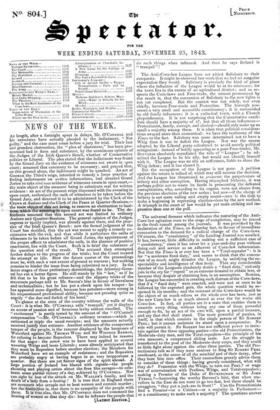NEWS OF THE WEEK.
AT length, after a fortnight spent in delays, Mr. O'CONNELL and his associates have actually pleaded to the indictment, " Not guilty," and the case must come before a jury for trial. Their last and grandest obstruction, the " plea of abatement," has been pro- nounced bad in form and substance, by the unanimous opinion of the Judges of the Irish Queen's Bench, whether of Conservative politics or Liberal. The plea stated that the indictment was found by the Grand Jury on the evidence of witnesses not sworn in open court; assumed that ceremony to be necessary ; and prayed that, on this ground alone, the indictment might be quashed. An act of GEORGE the Third's reign, intended to remedy a loose practice of finding indictments on written informations, had directed Grand Juries to take vied voce evidence of witnesses sworn in open court,— the main object of the measure being to substitute oral for written evidence : an act of the present reign dispensed with the swearing in open court, authorized the oath of witnesses to be taken before the Grand Jury, and directed it to be administered by the Clerk of the -Crown at Assizes and the Clerk of the Peace at Quarter-Sessions,- the main object of this.act being, to remove, an obstruction to busi- ness; which the sw "eatisrlirepen Court-ivisfnututtale. The de- fendants assumed that this second act was limited to ordinary Assizes and Quarter-Sessions. The general opinion of the Judges, express or tacitly implied, was already against them, and the prac- tice of theltish Queen's Bench : now the formal judgment of the Court' has decided, that the act was meant to apply a remedy co- extensive with the evil, and that while it authorizes the oaths of witnesses to be taken before all Grand Juries, the appointment of the proper officer to administer the oath, in the absence of positive enactment, lies with the Court. Such is in brief the substance of the question and of the result. The accused then attempted further delays to the progress of the trials ; but the Court treated the attempt as idle. Slow the future course of the proceedings must be, with such a vast extent of ground to traverse ; but nothing remains to hinder the issue from being submitted to a jury. In the latter stages of these preliminary skirmishings, the Attorney-Gene- ral has cut a better figure. He still stands by his "law," as if he felt that to be his great reliance—and the slippery tricks of the traversers perhaps add to Mr. Sutra's bias in favour of literalness and technicalities ; but he has put a check upon his temper : he has appeared more dignified, because less petulant—more strong in his unquestioned professional ability, because not pressing quite so angrily "the due and forfeit of his bond." To glance at the state of the country without the walls of the Court : it is what Mr. O'CorviiELL calls "tranquil," yet it displays an access of passion and of ferocious levity seldom excelled. The "excitement" is partly tested by the amount of the " O'Connell compensation "—Mr. O'CoNEELL's ordinary revenue—which is estimated at triple the usual receipts ; and the amounts actually received justify that estimate. Another evidence of the exasperated temper of the People, is the rancour displayed by the burgesses of Waterford against Mr. THOMAS WYSE and Sir WINSTON BmuioN, for refusing to become Repealers. There may indeed be reasons for that anger : the screw was to have been applied to several wavering Whigs and loose Liberals ; some already anticipated that they must be Repealers before another election ; the Members for Waterford have set an example of resistance ; and the Repealers are probably angry at having begun in so very inopportune a quarter. 'But there are yet fiercer signs of the spirit abroad. A large portion of. Ireland has blazed with t signals—the people shouting and playing antics about the fires like savages—to cele- brate some partial victory of a day, achieved by O'CONNELL. Nor can sight be lost of the attack on Mr. WALLER'S family, and the death of a lady from a beating ! It is true that in England there are monsters who scruple not to beat women and commit murder ; but the distinction is, that there is no sympathy of the people with them. It iti-frue also, that Mr. O'CONNELL does not command the heating of women so that they die; but he inflames the people that
do such things when inflamed. And then he says Ireland is " tranquil " !


























